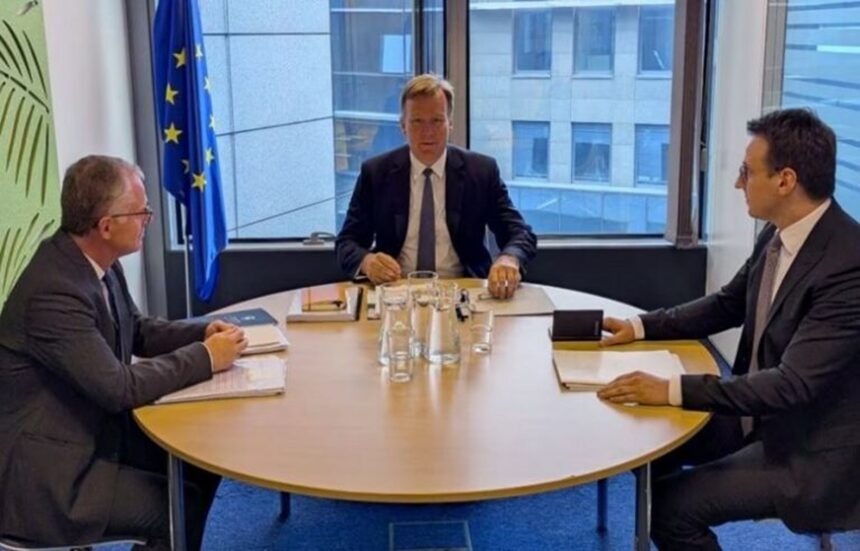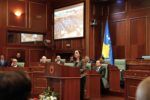The latest round of the dialogue on normalizing relations between Kosovo and Serbia in Brussels concluded without any progress. Kosovo insisted on the full implementation of the Agreement on the path toward normalization, while Serbia demanded that the part concerning the Association of Serb-Majority Municipalities be implemented first.
Kosovo’s chief negotiator, Besnik Bislimi, stated after the meeting with Serbian negotiator Petar Petković and the European mediator, Peter Sorensen, that he insisted on addressing separately the issue related to the commissions for missing persons.
“The idea today was to first make progress on the establishment of the joint commission for forcibly disappeared persons and then, in the second part, to hold a meeting where both parties—Kosovo and Serbia—submit concrete proposals, after which version ten of the sequencing plan could become an acceptable plan for the parties,” Bislimi told journalists in Brussels.
However, Bislimi noted that the commission for missing persons was not established because Serbia apparently “withdrew from the agreement on the terms of reference that we finalized at the end of December last year, claiming that they wanted to intervene in the document once more, which was not accepted by Brussels nor by our side.”
The Commission for Missing Persons is part of the Joint Declaration on Missing Persons, which Kosovo and Serbia reached in 2023 as part of the dialogue for normalizing relations. On December 17, 2024, both countries agreed to implement this declaration.
Bislimi said that regarding the other discussion points, Kosovo offered three proposals, but Serbia insisted that the Association be established first.
“These proposals involved ensuring that Articles 1 through 4 are included in the basic agreement, as this guarantees the fulfillment of a clause in the annex that both parties agree to fully implement the basic agreement. We requested that Serbia’s obligation not to block Kosovo’s membership in international organizations be moved from the end of the plan to the top. We also requested that any ambiguity be eliminated through precise language. Meanwhile, Serbia refused to provide concrete proposals. Serbia’s position can be interpreted simply: first the Association as a precondition, followed by Serbia’s red lines, which implies that Serbia has effectively withdrawn from the basic agreement or refuses to discuss it,” Bislimi stated.
Kosovo and Serbia reached the Agreement on the Path to Normalization, known as the Ohrid Agreement, in 2023. Although the agreement has not been signed, the European Union insists it is binding for both parties.
The 11-article agreement foresees, among other things, a degree of self-management for the Serbian community in Kosovo, mutual recognition of state symbols, Serbia not blocking Kosovo’s membership in international organizations, and requires both Pristina and Belgrade to implement all prior agreements reached during the dialogue.
According to Kosovo’s chief negotiator, Serbia halted discussions when he raised the issue of Kosovo’s government funds being blocked from reaching farmers in the Preševo Valley.
Petković: Insistence on the Association
After the talks, Serbia’s chief negotiator, Petar Petković, stated that he insisted on establishing the Association. According to him, Kosovo is not interested in creating such an association, adding that Bislimi did not want to respond on whether he would accept the European proposal on the Association’s statute.
“If there is no Association, the issue of the survival of the Serbian people in Kosovo arises. This is a humanitarian issue for us because the Serbian population can no longer withstand the terror imposed by the policies of [acting Prime Minister of Kosovo, Albin] Kurti. I conveyed this clearly to Mr. Bislimi,” Petković emphasized.
The Serbian negotiator added that during the three-party meeting, he insisted on starting concrete discussions on the statute of the Association but again blamed Kosovo for not being interested in establishing it.
Regarding missing persons, Petković stated, “We are committed to resolving this issue, first and foremost for the families who have been waiting for more than 20 years to learn the full truth about their loved ones.”
In addition to the three-party meeting, Bislimi and Petković had earlier held separate meetings with the European mediator, Sorensen.
LDK Opposes Bislimi’s Participation in the Dialogue
The Democratic League of Kosovo (LDK), which came third in the February elections, criticized the decision of Kosovo’s acting government to send Bislimi to Brussels for the dialogue with Serbia, describing it as “unjustified and lacking any citizen or institutional legitimacy.”
“Representation in the dialogue can only be based on legitimate institutions elected by the people and supported by the sovereign,” LDK stated.
Since the February elections, Kosovo has yet to form a new executive, as no party secured enough votes to form institutions independently, and no agreement has been reached among parties for creating a new government.
“The dialogue with Serbia is a sensitive process that determines the future of our state. This process cannot be reduced to unilateral decisions by an acting government that no longer enjoys public trust or the necessary majority to take responsibilities at this level. Such actions harm Kosovo’s international credibility and risk undermining our Euro-Atlantic path,” LDK said in a press statement, according to RFE.
Following the Brussels talks, Bislimi dismissed LDK’s reaction as “nonsense,” stating that he is the acting deputy prime minister, also tasked with the dialogue.
“The mandate was given to me by the government and can be revoked by the government,” he said.
The new round of dialogue at the level of chief negotiators took place after European mediator Peter Sorensen visited Kosovo and Serbia in August.







